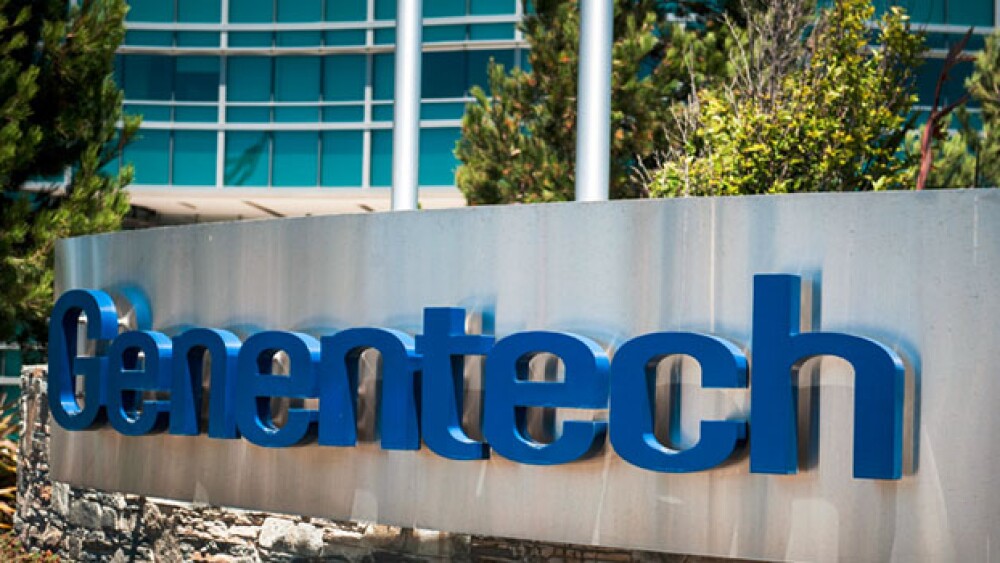Genentech, a Roche company, and Microbiotica signed a multi-year strategic collaboration to discover, develop and commercialize biomarkers, targets and drugs for inflammatory bowel disease (IBD).
Genentech, a Roche company, and Microbiotica, in Cambridge, England, signed a multi-year strategic collaboration to discover, develop and commercialize biomarkers, targets and drugs for inflammatory bowel disease (IBD).
Microbiotica was spun out of the Wellcome Sanger Institute 18 months ago, and focuses on microbiome-based therapeutics. Under the deal, Microbiotica will use its precision metagenomics microbiome platform to analyze samples from clinical trials of Genentech’s IBD drugs. The goal is to identify microbiome biomarker signatures of drug response, with hopes of finding novel IBD drug targets and potentially develop live bacterial therapeutic products.
This is a relatively new area of drug development and health, the study of how different bacterial strains of bacteria living in the human body effect various disease states.
Genentech is paying Microbiotica an undisclosed upfront payment. It will be eligible for various milestone payments up to $534 million. Also, Microbiotica will be eligible to receive royalties on sales of specific products that might come out of the collaboration. Genentech also has the option to license assets the company might develop out of the collaboration.
“This brings together a world-class pipeline of investigational IBD medicines from Genentech with the world-class microbiome capability of Microbiotica,” said Mike Romanos, chief executive officer of Microbiotica, in a statement. “We are excited by the opportunity to work with Genentech scientists in order to bring precision metagenomics into the clinical arena for the first time, enabling us to develop biomarkers and medicines for the benefit of patients.”
In early May, Genentech signed a strategic drug discovery collaboration with Lodo Therapeutics, a New York City-based company. That deal could potentially be worth more than $1 billion. Under the terms of that deal, Genentech will use Lodo’s proprietary genome mining and biosynthetic cluster assembly platform to identify potential therapeutics against multiple disease targets. Again, there was an undisclosed upfront payment, but Lodo is eligible for various milestone payments that could hit $969 million. Lodo will also be eligible for tiered royalties.
Lodo’s platform identifies and produces bioactive natural products directly from the microbial DNA sequence information contained in dirt. The information in the organisms’ genomes drive the company’s discovery programs. It was founded on the scientific work of Sean Brady, head of The Rockefeller University’s Laboratory of Genetically Encoded Small Molecules.
These two deals indicate a strong interest on the part of Genentech in developing new drugs based on microbiomes. James Sabry, senior vice president and global head of Genentech Partnering said in a statement, “We believe the microbiome represents a new paradigm in biomedicine, both for understanding drug response and as a novel therapeutic modality. We have chosen to collaborate with Microbiotica because of its high-quality science and look forward to working together to potentially bring new medicines to people suffering from IBD.”
Overall, there’s quite a bit of movement—no pun intended—in this area of research. In April 2018, Ferring Pharmaceuticals, headquartered in Saint-Prex, Switzerland, acquired Roseville, Minnesota’s Rebiotix. Ferring focuses on reproductive medicine and women’s health, with specialty areas within gastroenterology and urology. Rebotix is a late-stage clinical microbiome company.
In April 2017, Takeda Pharmaceutical Company signed a global collaboration deal with Somerville, Massachusetts-based Finch Therapeutics. They will jointly develop FIN-524, a live biotherapeutic product made up of cultured bacterial strains that have been associated with favorable clinical outcomes in research of microbiota transplantations in IBD.
And in April 2018, Synlogic, based in Cambridge, Massachusetts, dosed its first patient in its Phase Ib/IIa clinical trial of SYNB1020 for hyperammonemia, a metabolic disorder characterized by excess ammonia in the blood. SYNB1020 is a Synthetic Biotic, taken orally. It can act in the gut to compensate for the dysfunctional metabolic pathway. The company’s approach is to program naturally-occurring microbes using synthetic biology tools. The engineered microbiome then effects the body’s metabolic dysregulation.
Although these examples all focus on bowel diseases, there is quite a bit of work looking at how the microbiota affect every organ system and disease state.





